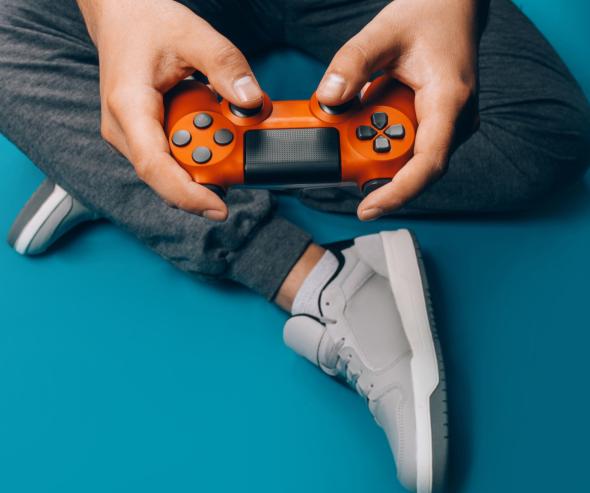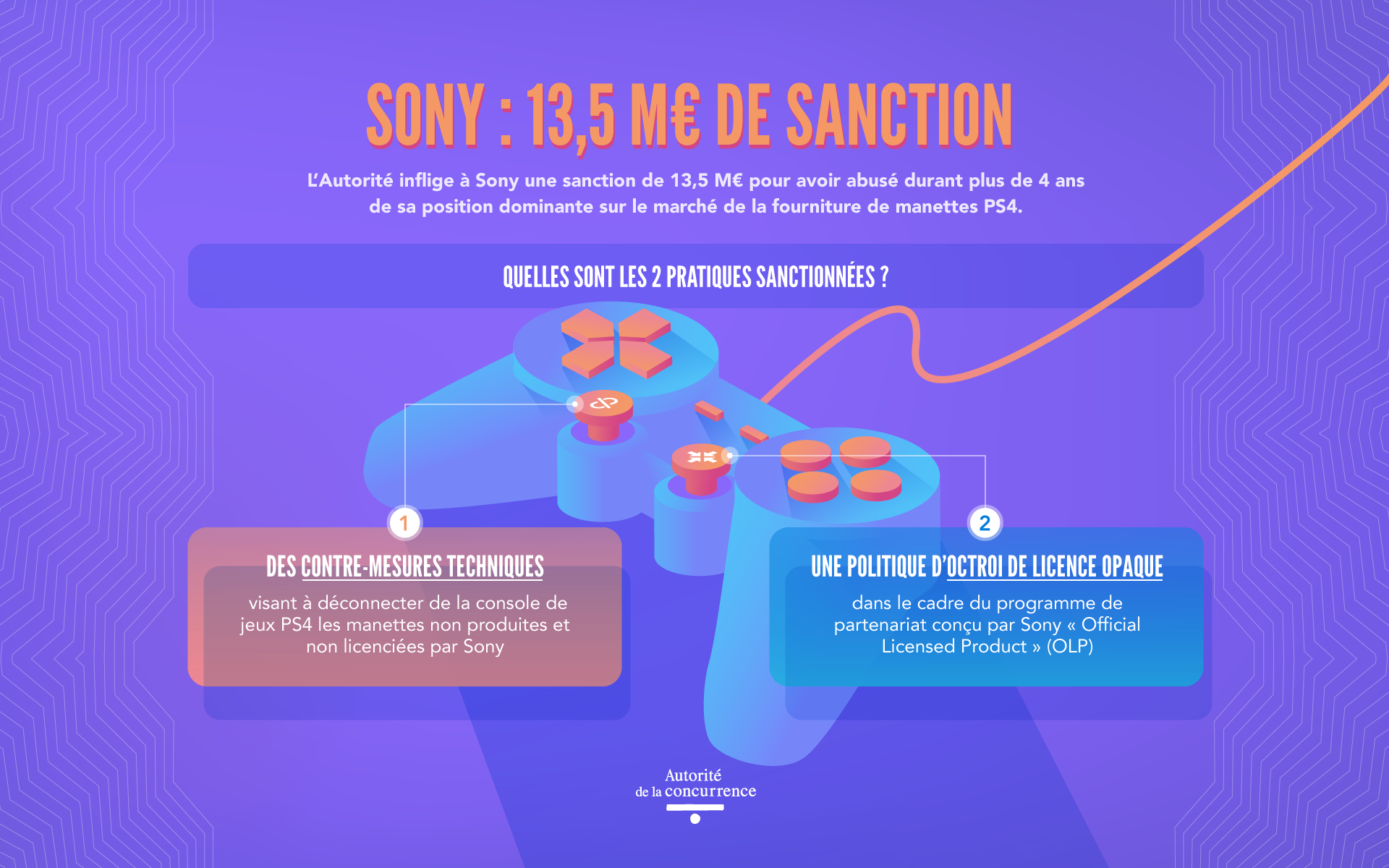The Autorité de la concurrence fines Sony €13.5 million for abusing its dominant position in the market for the supply of video game controllers for PS4

Background
Following a referral from Subsonic, a French manufacturer of video game controllers, the Autorité has fined Sony (four group companies, including the Japanese parent company) for abusing its dominant position in the market for the supply of video game controllers for PlayStation 4 (PS4) consoles for more than four years.
The Autorité has sanctioned two practices:
- First, Sony’s use, from November 2015, of technical countermeasures, allegedly implemented to combat counterfeiting, which affected the proper functioning of third-party video game controllers (produced by manufacturers other than Sony and without an official Sony licence), regularly leading to them being disconnected during console operating system updates.
While the Autorité stresses the legitimacy of the objective of combating counterfeiting, it points out that such measures were disproportionate, since they affected all “unlicensed” controllers indiscriminately.
- Second, an opaque licensing policy, which in several cases prevented rival companies that wanted to market PS4-compatible controllers from joining the OLP partnership programme, which is the only way for third parties to obtain an official licence and unique identification numbers. The Autorité found that by refusing to communicate the OLP access criteria to manufacturers who requested them, Sony applied the criteria in a discretionary manner, even though access to the programme was the only way to avoid disconnections.
The Autorité considers that the combination of these two practices significantly damaged the brand image of the third-party manufacturers affected, with regard to both players and distributors, slowing down their expansion in the market and leading to their possible foreclosure.
The fine, amounting to €13,527,000, is imposed jointly and severally on three subsidiaries and the parent company of the Sony group:
- Sony Interactive Entertainment Europe Limited (in charge of the licensing programme in Europe);
- Sony Interactive Entertainment Inc. K.K (responsible for rolling out operating system updates for the PS4 console);
- Sony Interactive Entertainment France (responsible for marketing controllers in France);
- Sony Group Corporation (parent company).

The PS4 controller production model
The PS4 is Sony’s 8th-generation console. On sale since 2019, it comes with a PS4 controller called a DualShock 4, designed by Sony. This same controller is also sold separately, as video game controllers are the best-selling console accessory.
There are three different types of PS4 controllers:
- controllers produced by Sony;
- controllers produced by manufacturers under licence from the Sony group;
- controllers produced by third parties that do not have an official licence.
With its brand image, reliability and quality and the perfect, long-lasting compatibility of its controllers with the PS4 console, Sony is in a dominant position in the market for the supply of PS4 controllers.
The barriers to entry and expansion erected by Sony
The Autorité found that Sony had abused its dominant position by implementing two practices simultaneously: technical countermeasures aimed at disconnecting controllers not produced and licensed by Sony from the PS4 console, and an opaque licensing policy, under the OLP[1] partnership programme alone, which is difficult to integrate in practice.
- Technical countermeasures
The controllers produced by Sony and by manufacturers that are members of the OLP programme, and which thus have an official licence, are fitted with a chip containing a unique identification number that Sony can, in principle, use to identify them. The Autorité found that, during certain updates to the PS4 console, Sony caused controllers without an identification number or controllers with a number duplicated on a large scale to be disconnected. As a result, all the controllers produced by third parties outside the OLP programme were affected. While the Autorité found that manufacturers were able to respond to these disconnections, a posteriori, by giving their users “corrective patches”, it points out that these patches were not immediately available and not always easy to install. As a result, some users could reasonably have believed that the disconnections affecting their controllers were attributable to the manufacturers of these controllers and their lack of quality.
To justify these countermeasures, Sony claimed that they were taken to combat the infringement of its intellectual property rights. While the Autorité considers that Sony was pursuing a legitimate objective in taking measures to combat counterfeiting, it points out that these measures were not proportionate with this objective. The disconnection of video game controllers other than those sold by Sony and those under licence affected all third-party controllers, whether counterfeit or not. In the Autorité’s view, the absence of a licence is not sufficient to prove that the controllers are counterfeit. As a result, Sony took deactivation measures that affected both infringing controllers and unlicensed but non-infringing controllers.
The Autorité recalls that the French system for protecting intellectual property, and in particular patents, relies first and foremost on legal recourse. By taking technical countermeasures against companies that it had not been able to convict of counterfeiting before the French courts, Sony went further than was strictly necessary to achieve its objective, such that the restriction of competition resulting from its practices cannot be justified.
- An opaque licensing policy
In parallel with these technical countermeasures, Sony made access to its OLP partnership programme opaque. In particular, the Autorité noted that Sony limited both the licensing of its intellectual property and the granting of unique identification numbers for avoiding disconnection to the members of this partnership programme.
The Autorité found that the criteria for accessing the license and the identification numbers were not communicated to all manufacturers who requested them, and were imprecise enough to lend themselves to discretionary application. As a result, Subsonic, like other manufacturers, was never able to obtain Sony’s membership criteria. The Autorité therefore considers that Sony’s licensing policy was opaque, difficult to understand and therefore difficult to integrate in practice.
As a result, these unlicensed companies had to cope with the untimely disconnections implemented by Sony as part of software updates, without being able to join the licensing programme.
These practices damaged their brand image. In this respect, the Autorité found that dissatisfied users were discouraged from buying controllers from third-party manufacturers without a licence, but also that their negative comments dissuaded other users from buying them, with the result that these new buyers logically switched their choice to a Sony controller or one approved by Sony as part of the licensing programme.
Sony fined €13,527,000
The Autorité considers that Sony abused its dominant position for more than four years, between November 2015 and April 2020, i.e. for most of the life of the PS4 console. For this reason, it has jointly and severally fined four Sony group companies: Sony Interactive Entertainment Europe Limited (in charge of the licensing programme in Europe); Sony Interactive Entertainment Inc. K.K (responsible for rolling out operating system updates for the PS4 console); Sony Interactive Entertainment France (responsible for marketing controllers in France) and Sony Group Corporation.
Furthermore, the Autorité found that Sony implemented the measures constituting the infringement at a time when this market was opening up to competition, and continued to do so throughout the period during which this market was able to allow competitors to flourish. While Sony claimed that the unlicensed controllers were inevitably trademark or patent infringements, the Autorité rejected this argument, pointing out that the patents invoked by Sony expired or were about to expire during the period of the practices. The technical countermeasures could, therefore, have the effect of extending the exclusive rights conferred by the patents, even after the invention had fallen into the public domain.
Accordingly, the Autorité considers Sony’s anticompetitive behaviour to be particularly serious and, applying the methodology set out in its procedural notice on fines, has imposed a fine of €13,527,000.
[1] Sony’s “Official Licensed Product” (OLP) partnership programme. Under this programme, the companies concerned can receive a licence to use the intellectual property rights held by Sony for the manufacture of certain controllers that are compatible with the PS4 console. In Sony’s own words, it “allows an accessory manufacturer to obtain the right to use the Sony logo on its packaging for a given product to show that it is officially approved by Sony.” Licensed controllers, like Sony controllers, also have a unique identification number, which Sony can use to identify them.
Contact(s)

